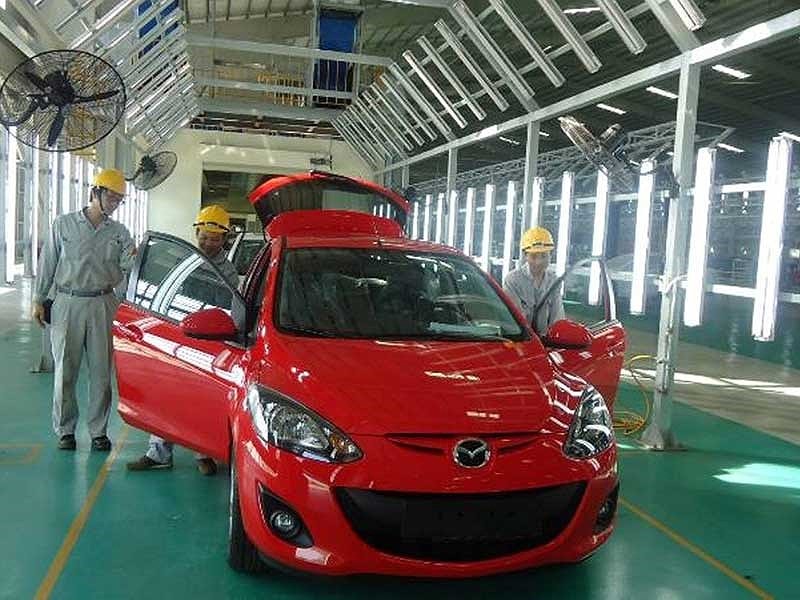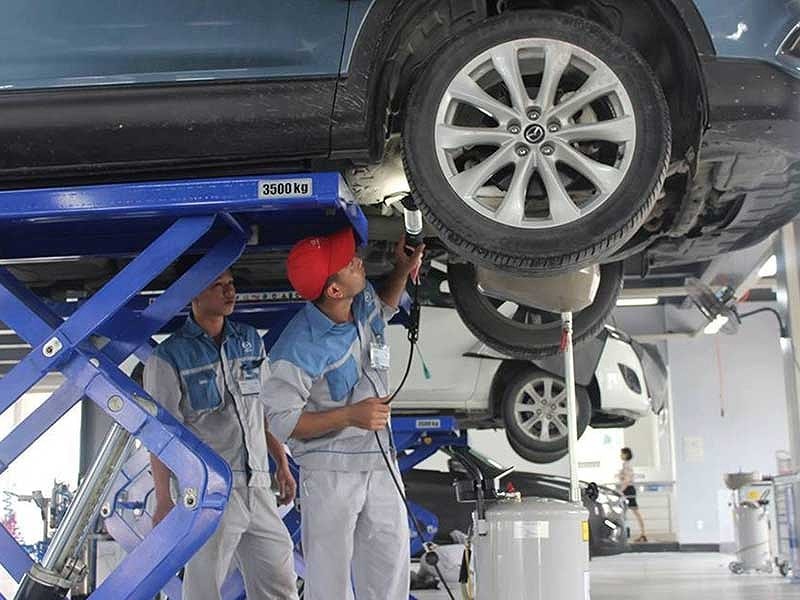Exemption of 2 car taxes: Who benefits?
Cars manufactured and assembled in Vietnam have the opportunity to reduce prices thanks to tax exemptions and reductions.
The Ministry of Finance recently responded to the proposals of the Ministry of Industry and Trade, the Vietnam Association of Mechanical Enterprises (VAMI), Thanh Cong Group Joint Stock Company... related to special consumption tax (SCT) and import tax on auto components.
Big change
Accordingly, the Ministry of Finance said it is considering and reporting to the Government on the exemption of special consumption tax for the domestic production value applied to automobile products. Thereby, it aims to encourage car manufacturers to increase the value-added content of domestically produced products.
Regarding the proposal to exempt or reduce import tax on raw materials for component manufacturers investing in Vietnam, the Ministry of Finance stated: According to the list of preferential investment industries, the industry of manufacturing supporting industrial products according to the Prime Minister's decision is a particularly preferential investment industry; the industry of manufacturing automobiles and auto parts is a preferential investment industry. Therefore, the Ministry of Finance will coordinate with relevant ministries to study the handling plan and report to the Government for consideration and decision.
If the above policy is put into practice, it will greatly support joint ventures and enterprises in protecting domestically assembled and manufactured cars. The reason is that currently, automobile manufacturing and assembling companies in Vietnam have to pay a fairly high import tax on components of 15%-25% depending on the type of component. This is one of the reasons why the cost of manufacturing cars in Vietnam is much higher than in Thailand and Indonesia.
 |
| Currently, automobile manufacturing and assembly companies in Vietnam have to pay quite high import taxes on components. |
At the same time, this is also considered a major change in the Ministry of Finance's viewpoint on tax exemption and reduction for automobiles. Because previously, in the draft amendments to tax laws, the Ministry of Finance said that the proposal to give preferential special consumption tax on the domestic value of automobile products was not consistent with the national treatment rules stated in the General Agreement on Tariffs and Trade (GATT).
Even at the end of 2017, a representative of the Ministry of Finance argued that if tax exemptions and reductions were not linked to production requirements and localization rates, it would be difficult to maintain the automobile industry. "In reality, since 2004, despite receiving many incentives, the localization rate is still low," a representative of the Ministry of Finance once stated.
There are still mixed opinions.
A representative of Hyundai Thanh Cong Automobile Company said that the exemption of special consumption tax for the domestic production value of automobile products has been applied by countries in the Southeast Asian region such as Malaysia, Indonesia... for a long time. The goal is to encourage domestic manufacturing and assembly companies to increase investment in the supporting industry sector, increase the localization rate of products as well as make it easier to access output to have competitive selling prices.
“Currently, the localization rate of automobile products in Vietnam is still quite low, making it difficult for domestically produced and assembled products to be exported to neighboring markets. Therefore, exempting special consumption tax for the domestic production value is a very optimal solution,” said a representative of Hyundai Thanh Cong.
Sharing the same view, Mr. Tran Ba Duong, Chairman of the Board of Directors of Truong Hai Auto Corporation (Thaco), commented that if special consumption tax is exempted for the value created domestically, it will create a significant advantage for domestically produced and assembled vehicles. Mr. Duong emphasized: "Car models produced and assembled domestically with large output will have the opportunity to promote localization and reduce prices more. In the near future, car models produced and assembled in Vietnam will have very competitive prices and consumers will benefit."
 |
| Car manufacturing and assembly at a business. |
Ms. Nguyen Thi Hien, in charge of the Toyota used car system, analyzed: In addition to the high tax on raw materials for manufacturing components, domestically produced and assembled cars are also subject to a very high special consumption tax of 40%-50%. Therefore, if these taxes can be reduced for the domestic production part, the cost of domestic car production will decrease, leading to a further reduction in the price of domestic cars by tens of millions of VND per car.
However, many people believe that incentives for domestic cars will create barriers to imported cars, pushing up the price of imported cars. Then, those who want to buy imported cars will have to spend more money to own this type of car. Not to mention that the domestic car manufacturing and assembly industry has had too many incentives, but so far the price is still high, meaning that only car manufacturers benefit while customers suffer.
